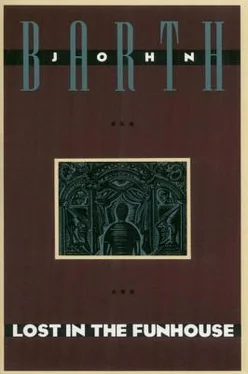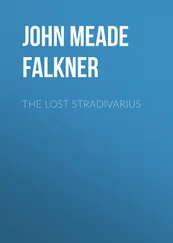John Barth - Lost in the Funhouse
Здесь есть возможность читать онлайн «John Barth - Lost in the Funhouse» весь текст электронной книги совершенно бесплатно (целиком полную версию без сокращений). В некоторых случаях можно слушать аудио, скачать через торрент в формате fb2 и присутствует краткое содержание. Год выпуска: 2014, ISBN: 2014, Издательство: Knopf Doubleday Publishing Group, Жанр: Современная проза, на английском языке. Описание произведения, (предисловие) а так же отзывы посетителей доступны на портале библиотеки ЛибКат.
- Название:Lost in the Funhouse
- Автор:
- Издательство:Knopf Doubleday Publishing Group
- Жанр:
- Год:2014
- ISBN:978-0-8041-5250-1
- Рейтинг книги:3 / 5. Голосов: 1
-
Избранное:Добавить в избранное
- Отзывы:
-
Ваша оценка:
- 60
- 1
- 2
- 3
- 4
- 5
Lost in the Funhouse: краткое содержание, описание и аннотация
Предлагаем к чтению аннотацию, описание, краткое содержание или предисловие (зависит от того, что написал сам автор книги «Lost in the Funhouse»). Если вы не нашли необходимую информацию о книге — напишите в комментариях, мы постараемся отыскать её.
Lost in the Funhouse — читать онлайн бесплатно полную книгу (весь текст) целиком
Ниже представлен текст книги, разбитый по страницам. Система сохранения места последней прочитанной страницы, позволяет с удобством читать онлайн бесплатно книгу «Lost in the Funhouse», без необходимости каждый раз заново искать на чём Вы остановились. Поставьте закладку, и сможете в любой момент перейти на страницу, на которой закончили чтение.
Интервал:
Закладка:
Goodbye. Is it over? Can’t you read between the lines? One more step. Goodbye suspense goodbye.
Blank.
Oh God comma I abhor self-consciousness. I despise what we have come to; I loathe our loathesome loathing, our place our time our situation, our loathesome art, this ditto necessary story. The blank of our lives. It’s about over. Let the dénouement be soon and unexpected, painless if possible, quick at least, above all soon. Now now! How in the world will it ever
GLOSSOLALIA
Still breathless from fending Phoebus, suddenly I see all — and all in vain. A horse excreting Greeks will devour my city; none will heed her Apollo loved, and endowed with clear sight, and cursed when she gainsaid him. My honor thus costlily purchased will be snatched from me by soldiers. I see Agamemnon, my enslaver, meeting death in Mycenae. No more.
Dear Procne: your wretched sister — she it is weaves this robe. Regard it well: it hides her painful tale in its pointless patterns. Tereus came and fetched her off; he conveyed her to Thrace … but not to see her sister. He dragged her deep into the forest, where he shackled her and raped her. Her tongue he then severed, and concealed her, and she warbles for vengeance, and death.
I Crispus, a man of Corinth, yesterday looked on God. Today I rave. What things my eyes have seen can’t be scribed or spoken. All think I praise His sacred name, take my horror for hymns, my blasphemies for raptures. The holy writ’s wrongly deciphered, as beatitudes and blessings; in truth those are curses, maledictions, and obscenest commandments. So be it.
Sweet Sheba, beloved highness: Solomon craves your throne! Beware his craft; he mistranslates my pain into cunning counsel. Hear what he claims your hoopoe sang: that its mistress the Queen no longer worships Allah! He bids you come now to his palace, to be punished for your error.… But mine was a love song: how I’d hymn you, if his tongue weren’t beyond me — and yours.
Ed’ pélut’, kondó nedóde, ímba imbá imbá. Singé erú. Orúmo ímbo ímpe ruté sceléte. Impe re scéle lee lutó. Ombo té scele té, beré te kúre kúre. Sinté te lúté sinte kúru, te ruméte tau ruméte. Onkó keere scéte, tere lúte, ilee léte leel’ lúto. Scélé.
Ill fortune, constraint and terror, generate guileful art; despair inspires. The laureled clairvoyants tell our doom in riddles. Sewn in our robes are horrid tales, and the speakers-in-tongues enounce atrocious tidings. The prophet-birds seem to speak sagely, but are shrieking their frustration. The senselessest babble, could we ken it, might disclose a dark message, or prayer.
LIFE-STORY
1
Without discarding what he’d already written he began his story afresh in a somewhat different manner. Whereas his earlier version had opened in a straight-forward documentary fashion and then degenerated or at least modulated intentionally into irrealism and dissonance he decided this time to tell his tale from start to finish in a conservative, “realistic,” unself-conscious way. He being by vocation an author of novels and stories it was perhaps inevitable that one afternoon the possibility would occur to the writer of these lines that his own life might be a fiction, in which he was the leading or an accessory character. He happened at the time *to be in his study attempting to draft the opening pages of a new short story; its general idea had preoccupied him for some months along with other general ideas, but certain elements of the conceit, without which he could scarcely proceed, remained unclear. More specifically: narrative plots may be imagined as consisting of a “ground-situation” (Scheherazade desires not to die) focused and dramatized by a “vehicle-situation” (Scheherazade beguiles the King with endless stories), the several incidents of which have their final value in terms of their bearing upon the “ground-situation.” In our author’s case it was the “vehicle” that had vouchsafed itself, first as a germinal proposition in his commonplace book — D comes to suspect that the world is a novel, himself a fictional personage — subsequently as an articulated conceit explored over several pages of the workbook in which he elaborated more systematically his casual inspirations: since D is writing a fictional account of this conviction he has indisputably a fictional existence in his account, replicating what he suspects to be his own situation. Moreover E, hero of D’s account, is said to be writing a similar account, and so the replication is in both ontological directions, et cetera. But the “ground-situation”—some state of affairs on D’s part which would give dramatic resonance to his attempts to prove himself factual, assuming he made such attempts — obstinately withheld itself from his imagination. As is commonly the case the question reduced to one of stakes: what were to be the consequences of D’s — and finally E’s — disproving or verifying his suspicion, and why should a reader be interested?
What a dreary way to begin a story he said to himself upon reviewing his long introduction. Not only is there no “ground-situation,” but the prose style is heavy and somewhat old-fashioned, like an English translation of Thomas Mann, and the so-called “vehicle” itself is at least questionable: self-conscious, vertiginously arch, fashionably solipsistic, unoriginal — in fact a convention of twentieth-century literature. Another story about a writer writing a story! Another regressus in infinitum! Who doesn’t prefer art that at least overtly imitates something other than its own processes? That doesn’t continually proclaim “Don’t forget I’m an artifice!”? That takes for granted its mimetic nature instead of asserting it in order (not so slyly after all) to deny it, or vice-versa? Though his critics sympathetic and otherwise described his own work as avant-garde, in his heart of hearts he disliked literature of an experimental, self-despising, or overtly metaphysical character, like Samuel Beckett’s, Marian Cutler’s, Jorge Borges’s. The logical fantasies of Lewis Carroll pleased him less than straight-forward tales of adventure, subtly sentimental romances, even densely circumstantial realisms like Tolstoy’s. His favorite contemporary authors were John Updike, Georges Simenon, Nicole Riboud. He had no use for the theater of absurdity, for “black humor,” for allegory in any form, for apocalyptic preachments meretriciously tricked out in dramatic garb.
Neither had his wife and adolescent daughters, who for that matter preferred life to literature and read fiction when at all for entertainment. Their kind of story (his too, finally) would begin if not once upon a time at least with arresting circumstance, bold character, trenchant action. C flung away the whining manuscript and pushed impatiently through the french doors leading to the terrace from his oak-wainscoted study. Pausing at the stone balustrade to light his briar he remarked through a lavender cascade of wisteria that lithe-limbed Gloria, Gloria of timorous eye and militant breast, had once again chosen his boat-wharf as her basking-place.
By Jove he exclaimed to himself. It’s particularly disquieting to suspect not only that one is a fictional character but that the fiction one’s in — the fiction one is — is quite the sort one least prefers. His wife entered the study with coffee and an apple-pastry, set them at his elbow on his work table, returned to the living room. Ed’ pelut’ kondo nedode; nyoing nyang. One manifestation of schizophrenia as everyone knows is the movement from reality toward fantasy, a progress which not infrequently takes the form of distorted and fragmented representation, abstract formalism, an increasing preoccupation, even obsession, with pattern and design for their own sakes — especially patterns of a baroque, enormously detailed character — to the (virtual) exclusion of representative “content.” There are other manifestations. Ironically, in the case of graphic and plastic artists for example the work produced in the advanced stages of their affliction may be more powerful and interesting than the realistic productions of their earlier “sanity.” Whether the artists themselves are gratified by this possibility is not reported.
Читать дальшеИнтервал:
Закладка:
Похожие книги на «Lost in the Funhouse»
Представляем Вашему вниманию похожие книги на «Lost in the Funhouse» списком для выбора. Мы отобрали схожую по названию и смыслу литературу в надежде предоставить читателям больше вариантов отыскать новые, интересные, ещё непрочитанные произведения.
Обсуждение, отзывы о книге «Lost in the Funhouse» и просто собственные мнения читателей. Оставьте ваши комментарии, напишите, что Вы думаете о произведении, его смысле или главных героях. Укажите что конкретно понравилось, а что нет, и почему Вы так считаете.












